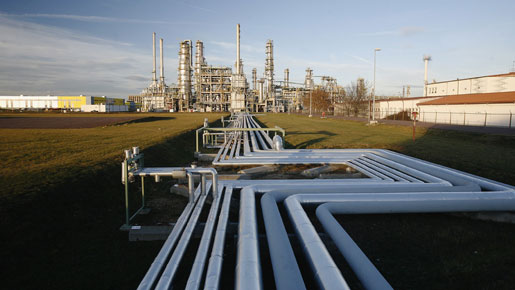
A senior U.S. official said Nabucco was as important to the United States, to help European allies diversify sources of supply and reduce dependency on Russia, as the Baku-Tblissi-Ceyhan (TBC) oil pipeline had been in the 1990s.
“The Nabucco pipeline will be built, I am convinced, because it makes commercial sense,” Deputy Assistant Secretary of State Matthew Bryza told reporters after talks with EU Energy Commissioner Andris Piebalgs.
“We are trying to build on the success of the last decade and expand the infrastructure put in place with the same commitment, the same intensity,” he said.
Bryza said the planned 3,300 km (2,051 mile) pipeline across Turkey to central Europe was a much more cost-efficient way of transporting gas from Azerbaijan to Europe than the rival South Stream pipeline project of Russian monopoly Gazprom.
“Nabucco makes eminently more commercial sense than any of the other projects,” he said, comparing the U.S. diplomatic effort to support the project with the intense campaign Washington waged in the late 1990s to promote the TBC pipeline.
“Follow your wallet. Do what makes sense,” he said.
As with the Baku-Ceyhan project, the United States was interested for both geopolitical and geo-economic reasons and would help the partners involved to synchronise their decisions, Bryza said.
Nabucco, which is a six-company consortium, is expected to start building in 2010 at an estimated cost of $6 billion. The pipeline could transport gas from northern and western Iraq as well as Azerbaijan and offshore Caspian fields, he said.
The EU-backed project has suffered from political wrangling, notably because of Turkish opposition to the participation of Gaz de France due to Paris’ opposition to Turkey’s EU membership bid, and to attempts by Russia to sign up partners for South Stream faster.
Gazprom signed Bulgaria and Serbia up last month to the Kremlin-backed rival project, which carries an official 10 billion euro ($14.82 billion) price tag, stoking U.S. fears Moscow could use its grip over energy supplies as a political tool.
Bryza said South Stream, which would run under the Black Sea from Russia to Bulgaria and then into central Europe with a spur via the Balkans to Italy, could cost $20-30bn to build.
Moving gas from Azerbaijan through Nabucco would be 40-50 percent cheaper than through South Stream, he said.
Bryza said he believed Nabucco would be built even if South Stream went ahead because there was sufficient projected gas demand in Europe as countries switched from coal-fired power stations to gas-fired ones to cut greenhouse gas emissions.

